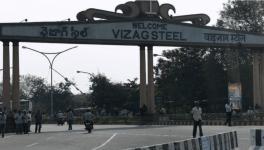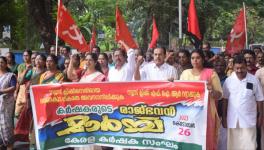Airtel Cheated the Exchequer by Fudging its Revenues: Paranjoy Guha Thakurta
Newsclick interviewed the journalist Paranjoy Guha Thakurta on the Draft Audit Report of the Comptroller & Auditor General of India. Paranjoy points out that the Department of Telecommunication (DoT), the supposed guardian of the public, was supporting Airtel to cheat the exchequer, Income Tax department and shareholders. Airtel fudged the figures to pay lower taxes to the government. Bharti Airtel group gained around Rs.44, 000 Crores through corporate restructuring and Rs.14, 500 Crores by under-reporting the revenues. Gross revenue reporting should be inclusive of all types of revenue earned in a fiscal year but Airtel did not do this and also deprived the shareholders by transferring assets to its subsidiary companies.
Note: The Draft Audit Report refers to the report titled 'Telecom Revenue paid by Bharti Airtel Limited and its Subsidiary Bharti Hexacom Limited to the Government of India during the financial years 2006-07 to 2009-10'.
Rough Transcript:
PP Purkayastha - Hello and welcome to Newsclick. Today we have with us Paranjoy Guha Thakurta, well known economic journalist. Paranjoy, you have done this recent story on the CAG draft report on Bharti's. Now of course first issue is how is the CAG, which is supposed to really audit government, why is it auditing private companies? It did it early in the case of Reliance and this time it has done it for a leading telecom company. Why it is extending its purview?
Paranjoy Guha Thakurta - That’s correct. This is most obvious question that you could have asked. Here is the body, a constitutional authority, the Comptroller and Audit General of India, which is mandated to oversee with the public finances have been utilised or not. What happened is on the 14th of April 2014, there was a land mark judgment of the Supreme Court of India which said, Yes, CAG has the right to audit the receipts, examine the receipts of private telecom companies; why? Because govt. is supposed to get a share of these receipts through by way of license fee, by way of spectrum usage charges and though the private telecom operators opposed the CAG audit tooth and nail through the Cellular Operators Association of India, eventually the Supreme Court ruled that yes, there is public money involved and if these private telecom companies if they do not account for their revenues properly, gross revenue and very contentious issue is what is called an adjusted grows of revenue, then at the end of the day, the exchequer, the public, the people of India, they lose. So this is the money which is supposed to come to the govt. through the Department of Telecommunication and therefore, since public money is involved, since public funds are involved, what the Supreme Court clearly said, but this audit would not be what is called a statutory audit but an examination of receipts to ascertain whether the govt. of India, the union govt. was getting its due share of revenue from these private telecom companies by way of license fee and spectrum usage charges.
PP - It is interesting that you raised the issue that one of the reasons why they are opened to audit is because they went to a revenue sharing model and if you remember that was in fact the Delhi Science Forum case in which I was involved, that essentially, it was originally license fees as flat fees which they have to pay. They fought and got into revenue share and therefore they open themselves now into a statutory audit. That’s really the issue.
PGT - Between 1999-2004, what had happened when you had these kind of license fee regime that was taking place and you had the transition in to be very specific, in August 1999. There was a huge controversy. You remember the then Minister of telecommunications, Mr Jagmohan, he had to put in his papers, he was literally forced to put in his paper, he was to leave kicking and screaming. There was all kind of views. Because what had happened earlier if you back in time, before 1996, when Pandit Sukhram was the telecom minister, he was telecom minister between January 1993 and May 1996 and this is long before he was raided by CBI and CBI found so much money in his house that it made it to the Guinness book of world records, later on Pandit Sukhram was arrested. What had happened essentially was that, it was very very flawed and I would say scandalous, system of tendering for licenses, where in a sense, companies were virtually encouraged to bid big and so the government will say "look we are going to get so much revenue" but everybody knew, including the telecom companies and the govt. that this money would never come. So eventually they never paid.
PP - So effectively, it was getting licenses on the wrong pretenses. You also argue that the two parts to what has happened, which makes Bharati such a, what shall we say, exemplar in business. They have been one of the highest risers of the net worth.
PGT - It is amazing company. I mean the flagship company alone in the financial year that ended on 31st of March 2015 had a revenue of 92000 Crores plus. It is one of the most profitable companies, it is one of the most glamorous corporate entity in the country, Mr Sunil Bharti Mittal is a kind of iconic figure as a first generation entrepreneur and mind you, it is not just India's biggest telecom operator, it is the world's 4th largest telecom operator. Today Bharati; its activity, its subscribers are spread across 20 countries, across the Asian continent and as well as the African continent. And why are they the fourth largest? They are fourth largest in terms of subscribers they claim that the end of March, they had 325 million subscribers. So it’s a huge company we are talking about.
PP - Now you argue that the CAG report, the draft report talks about two basic issues that are there with the kind of, shall we say imaginative accounting, that lot of Indian co-operative do; creative accounting.
PGT - Let us use plain and simple languages, financial fudge. It’s just they are fudging the figures.
PP - Fudging the figures, that two kinds of fudges you have registered this CAG draft report. One is the not paying the revenue share by underreporting what their gross revenue is, adjusted gross revenue, the AGRs you talk about that basically what revenue they got in they fudge that. The share of the govt. gets less if they show less revenue. This is one and the second that you have argued about is the restructuring of the company in whole in a way that they gain the share holders' such as Bharti gain, other share-holders apparently loose. Are these two major elements of the quote and unquote creating accounting or creative fudges?
PGT - absolutely correct. There are two elements of the fudge. One is what you can say under reporting of revenues. So when you under report revenues, you then pay less money to the govt. through license fee and spectrum usage charges. Now how was this started? The figure that the CAG arrives that is in the region about 14500 Crores and it comes under a number of heads. And it’s a kind of detailed in a very very meticulous kind of calculation, where under 23 specific heads, where they say how this company and its subsidiary Bharati Hexacom, they systematically under reported revenues; Why? Under reporting of PPI revenue, short payment of non-payment of the license fee and the spectrum usage charge on post -paid revenue, then non consideration of revenue from infrastructure sharing, non-payment of license fee and spectrum usage charges, roaming revenue. You know so it goes on, I mean non-consideration of interest income, interest fee loans to subsidiaries, so there are host of these under 23 different heads, including foreign exchange transactions, including showing that you are providing what is called PSTN (Public Switch Telephone Network), Services on which you are claiming under deduction, where as you actually using leased lines so there were series of accounting fudges that took place. All of which indicates that, and mind you, this only a four year period and this period happened five years ago. This is the period of the financial year 2006-07 to 2009-10. This is the UPA-1 and UPA-2 govt. We are not even talking about what is happened over the five years subsequently. But just during this four year period, these are the figures that the CAG has come.
PP - CAG has also identified they did not pay spectrum charges or official spectrum they held.
PGT - That is correct. So these are under various as I said there are 23 different heads. So not only that, they were given efficient spectrum and they were given spectrum on occasions free or at very below the rates that where at which they were given. So it is interesting that, here is a company, that remain unscarred and did not, was conspicuous why it's absence when the 2G scam was being talked about but today some years later we are come across, but to let me answer the question that you have raised. This is something very very interesting because in this particular instance, where corporate restructuring not only resulted in the under reporting of revenues, which are to be shared with the govt., you can indicate that it is actually also deprived the shareholders of Bharti Airtel of you know of what they could have got by way of dividends, etc. See, essentially what happened is, they underwent through an amaze, and this what CAG report punch, its literally amaze of transfers of assets. And there were about four companies involved. You had the Bharati Airtel, the flagship, you had two of this subsidiaries; Bharti Infratel and Bharti Infratel Ventures and you had another company with which other telecom operators including the rivals of Bharti and this is Indus towers, it is infrastructure sharing thing, all of them have involved and it shows that, you actually violated not only India's generally accepted accounting principles, Bharti's own auditors pointed this out. But that all it is did. It just pointed out that the manner in which these transfers of assets, and these complexes cross, you know within the subsidiaries that change in assets went against India's generally accepted accounting standard. And if you add it all up, it comes to as per the revaluation of investments in this four year period on intense specific transactions, the total gain to Bharati was about ten thousand or elven thousand crores and as per the market value of the shares received, it was about thirty thousand crores. So the total amount coming to over 44000 cores. And this in a sense is the indirect lost to the shareholders of Bharti as well as the govt. by the way of lower, by artificially suppressing the adjusted gross revenue, what the govt., I mean the department of telecommunications should have got by way of license fees and spectrum usage charges.
PP - Also there have been loss to income tax department because it didn't show the appreciation which should be actually the income.
PGT - On this point, I need to add one point that the income tax department indeed issued a show cause notice to the company and I am not aware of at what stage, what kind of answer the company has given but I can merely quote newspaper reports. There was an article that appeared on Economic Times on 29th of January 2014, quoting unnamed officials but they said, they could have transferred these as directly to Indus house instead of forming new company. So it was also a ledge non-payment of tax and you know if they were valued in the way it did, the value of the assets of the company would go up. So this according to the newspaper report, facts were misrepresented, not only to the income tax department but also to the Delhi High Court, to obtain approval of merger, De-mergers with Indus towers and the notice that income tax department's notice according to the newspaper report says that the SSC company Bharti Airtel has not disclosed the full and true intention in the scheme of arrangement approve by the High Court. I want to make one point, you know I think this CAG report and this is a report which is been prepared, the version of the report I have, was finalised on the 31st, on the last day of May and bits and pieces these report was send to the department of telecommunications between April and May 2015. But as we talk, the department of telecommunication has not responded. Were they sleeping on the job?
PP - The internal auditors of the DoT, and they are accord of powerful bodies so the fact that they did not react to the creating accounting or the accounting fudges of Bharti means that they were not protecting DoT's revenue so essentially DoT is culpable in this, wouldn't you agree?
PGT - You know, I would not only agree with, I am kind of tempted to use a little jingle which is used by the company to publicise its friendship. You know there is lovely little tune, a catchy little tune, I understand it is written by Amitabh Bhattacharya, the composer of the tune is Ram Samapth. It goes like this 'Jo Tera hai wo Mera Hai Jo mera Hai wo Tera ' and this seems to be symbolising the relationship between India's biggest telecom company Bharti Airtel and the Department of Telecommunication.
PP - As you know, the license fees are essentially spectrum charges. We call spectrum charges separately but most countries give licenses virtually free and charges very hefty amount for the spectrum which is scarce resource. So Bharti has been getting this scarce resource and what they supposed to pay to the people of India for this scarce resource, this is what they are not really paying, that the sum total of what Bharti has done. But what is the redress of the people?
PGT - You see, at this particular point of time I think there should be pressure put by civil society. I think somebody can put it an application that the Right to Information Act to ascertain to get hold of the copy of this draft report. Question should be asked of the department of telecommunications as to why they haven't replied. I think at the end of the day, after the CAG is processed it's drat report, CAG office receives the replies from the DoT then it is supposed to prepare a final report, then the final report supposed to be presented in parliament. So but I think even before that happens, I think there is lot of public interest involved, may be, there should be, it could be that since public revenues are involved, since public interest is involved, somebody could move a Public Interest Litigation, So I think at the end of the day, it is not just we are dealing with one company, we are not dealing with super star entrepreneur or a man who is the poster boy of Indian capitalism, it is not just fact that, the year ended on 31st of March 2015 according to the balance sheet of the company Mr Sunil Bharti Mittal took home an income, an earning of over 27 crores. I mean if you look at the median income, there is a mid-point, the Bharti group has about 33000+ employees and it is 324 times of the median income of this thirty thousand plus employees. So I don't have grudge against Mr Sunil Bharti Mittal for all the money that he has made. The only problem I had, this should not be made, I mean I forget his personal income. Money that has been made by the company should not have been made at the expense of the people of this country.
PP - Thank you very much for Paranjoy. We will come back to you with whatever you write further on this and as the case progresses.
Paranjoy - Thank you so much Prabir for having me on this program.
PP - This is all we have time for today, keep watching Newsclick.
DISCLAIMER: Please note that transcripts for Newsclick are typed from a recording of the program. Newsclick cannot guarantee their complete accuracy.
Get the latest reports & analysis with people's perspective on Protests, movements & deep analytical videos, discussions of the current affairs in your Telegram app. Subscribe to NewsClick's Telegram channel & get Real-Time updates on stories, as they get published on our website.
























